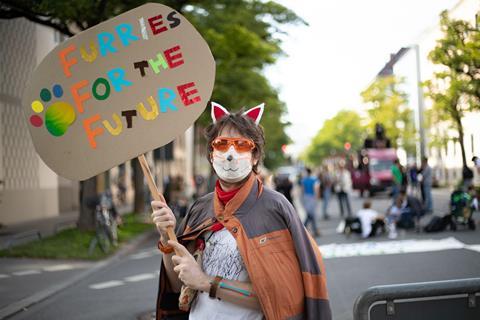Some Scottish schools are officially recognising species dysphoria and allowing students to identify as ‘furries’. Lizzie Harewood, CEO of the Association of Christian Teachers, says a compassionate ‘no’ to this contested ideology is the right response

The issue of children identifying as animals feels a bit like a game of Chinese whispers. Many people purport to have heard about cases - whether it’s a child requesting a litter tray in the school toilets or a student wearing a tail in class - but it’s unclear how many people actually know such an individual themselves.
Yet, my cynicism about such reporting might be misplaced. Recently, a Scottish council confirmed that at least two students, including one in primary school, have been officially recognised as having “species dysphoria” - a condition many psychologists say lacks scientific basis. This follows another case where a secondary school student was permitted to identify as a wolf.
Permitting a child to adopt animal monikers is, at its core, dehumanising
Part of me wants to laugh and roll my eyes - it’s absurd that adults would indulge in such misguided beliefs. It also makes me want to throw up my hands and ask: “What on earth is happening in Scotland?!” But with reports of children in England and Wales identifying as dinosaurs, horses or even the moon, this trend clearly isn’t isolated to one region - although Scotland seems to be the only nation to admit some kind of institutional affirmation (so far).
Though I struggle to stop the eye roll, I’m reminded of the Bible’s warnings against mockery: “Mockers stir up a city, but the wise turn away anger” (Proverbs 29:8). And Scripture speaks rather a lot about compassion for the vulnerable.
So how should Christians respond? Is compassionate acceptance the answer? Or should Christians make a stand against indulging such beliefs? Is it a symptom of society’s deeper decline, as it moves away from the Christian understanding of humanity and the Imago Dei? Or just overblown culture war hysteria?
Compassion and care
The first thing I’d say is that compassion is always the correct response to children who genuinely and unconsciously adopt animal-like behaviour. A speech therapist friend of mine once had a five-year-old patient who had suffered much trauma and had such complex needs that she was largely non-verbal. The child would mew, hiss and mimic cat-like behaviours - especially when emotionally dysregulated.
I don’t know if the child identified as a cat - her communication problems did not allow her to verbalise such an assertion - but I do know that the specialist team, who were incredibly compassionate towards her, did not affirm her as a cat. They saw it for what it was: a deeply disordered pattern of behaviour communicating profound needs.
I suspect that many cases, including those in Scotland and other media reports, don’t involve children who genuinely believe they are animals or ‘identify’ as another species. Instead, they’re likely embracing the ‘furry’ phenomenon; indeed, the council confirmed that the student identifying as a wolf is part of a ‘furries’ group.
In the ‘furry’ trend, people create animal personas, or ‘fursonas’, based on animal traits they relate to, often using pronouns such as ‘catself’ or ‘furself’. They often spend a lot of time online exploring their interest in anthropomorphic animals and, with some evidence suggesting that ‘furries’ are more likely to be diagnosed with autism spectrum disorder, it makes sense that, for neurodivergent kids, embracing ‘fursonas’ helps them navigate social interactions by celebrating what makes them different.
Safeguarding first
While this may seem harmless, and even a creative hobby, adult ‘furries’ often report sexual motivations for their interests, ringing alarm bells about potential links between sexuality, fetish, and animal identification. The use of anonymous online accounts and suspect motives in these groups should raise further serious safeguarding red flags.
Christian teachers - indeed any professional working with children - must be vigilant, not only in addressing animal-like behaviour or dress in school (for the simple fact it’s not appropriate) but also in recognising the vulnerabilities of children involved in online discussions of this nature. And Christian teachers, often leading the way in exposing the spread of gender ideology, may be best positioned to show schools that inclusion at all costs isn’t always in children’s best interests.
Embracing reality
It seems to be a natural conclusion of endorsing gender ideology that, eventually, other fantastical ideas about identity would soon be embraced. And with many teachers and professionals having, up to this point, endorsed contested ideologies about gender, Christians need to step up and be trailblazers in a simple task: lovingly telling the truth.
Compassion is always the correct response to children who adopt animal-like behaviour
Although the issue seems rare, it points to the bigger and more profound question: “What does it mean to be human?” Permitting a child to reject ‘he’ or ‘she’ as pronouns and adopting animal monikers is, at its core, dehumanising. Cross species identification screams of a generation wanting to escape reality and construct an existence that is easier to handle, or more exciting to engage in.
But as Christians, we know that children are precious in their humanity and made in the image of God. We also know that instead of fleeing from reality, we should embrace the truth. If we are believers, then our identity isn’t found in animal fantasies, sexual identities or gender labels, but in Christ.
As teachers committed to “speaking the truth in love” (Ephesians 4:15), offering students this good news is key. Helping young people to become all that God intends for them to be - as humans, either male or female - is a high calling indeed.





































1 Reader's comment